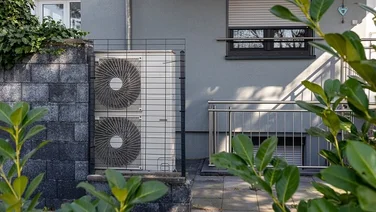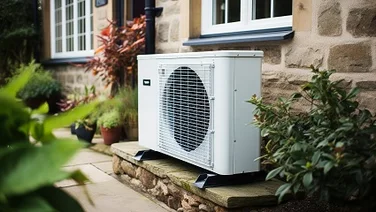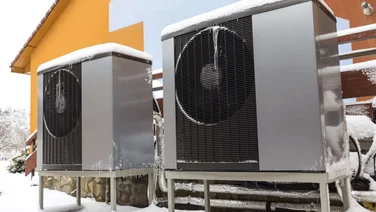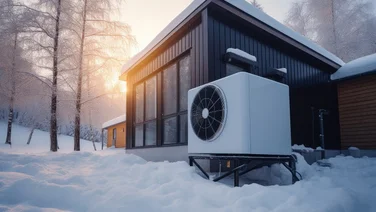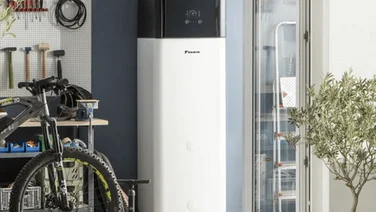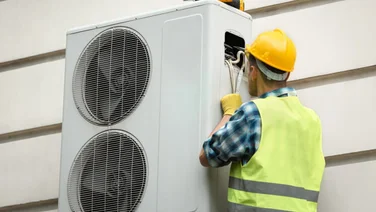We receive a small fee from trusted installers when you request a quote through our site. This helps us keep our content independent, well-researched and up to date – Learn more
- Air source heat pumps work at temperatures as low as -25°C
- Ground source heat pumps provide consistent heat in all weather
- Heat pumps are still three times more efficient than boilers when it’s below 0°C
Although heat pumps cost a little more upfront than some other heating methods, they are able to turn electricity into three times as much heat.
But air source heat pumps work by drawing warmth from the air just outside your house – so what happens when winter hits and the temperature takes a dive?
In this guide, we’ll explain how heat pumps keep going through the cold weather, when you should and shouldn’t worry, and what you can do to avoid your heat pump freezing in the winter months.
Want to skip ahead? Find the best heat pumps for your home by using our custom-built comparison tool. Simply enter a few details, and our professional installers will be in touch with free quotes.
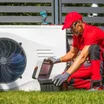
The Boiler Upgrade Scheme
Get up to £7,500 the cost of a heat pump through your installer. Click below for free quotes.
Can an air source heat pump work in cold weather?

Air source heat pumps continue to function when it gets cold outside, and in some cases all the way down to -25°C.
They absorb the warmth that is generated when atoms and molecules move quickly through the air, and that warmth still exists even when the temperature drops below freezing.
Warmth is actually present in all air that has a higher temperature than absolute zero (-273.15 °C), because atoms and molecules continue moving through the air until that point.
Heat pump technology hasn’t quite made it that far – but when you consider that the coldest permanently inhabited place on the planet, Oymyakon in Russia, is -47°C at time of writing, maybe absolute zero isn’t a worthwhile target.
Want to get a better idea of what it’s like to own an air source heat pump? Check out our case study with Louise, from South London.
Louise had a 12-kilowatt air source heat pump installed to reduce her reliance on fossil fuels, and received £5,000 off the upfront cost through the Boiler Upgrade Scheme. Now, Louise can enjoy a warm, even temperature throughout the house, without fluctuations.
Take a look at the full interview with Louise to learn more.
Are heat pumps less efficient when it’s cold?
Air source heat pumps usually lose efficiency as it gets colder, as they have to use more energy to draw warmth from the air. When there’s less warmth in the air, it takes more effort to gather it.
They start at a high bar though, since air source heat pumps are 300% to 400% efficient on average.
This means that at 300% efficiency, a heat pump produces three units of heat for every unit of electricity they use – which is three times better than a gas boiler.
This rate can fall to around two units when the temperature drops below 0 degrees Celsius (°C).
Heat pump efficiency is measured in units called ‘coefficient of performance’ (CoP), which is calculated by dividing the heat output of the heat pump by the energy input.
To illustrate what that means in terms of efficiency, if a heat pump’s CoP is around 3 at 0°C, that means it’s operating at 300% efficiency. Essentially, the higher the CoP, the more efficient the heat pump is.
The table below shows how the average air source heat pump’s efficiency changes based on the outside temperature:
Outside Temperature | Coefficient of Performance (CoP) |
|---|---|
15 °C | 4.3 |
13°C | 4.1 |
10°C | 3.9 |
7°C | 3.7 |
4°C | 3.3 |
2°C | 3.1 |
-1°C | 2.9 |
-4°C | 2.6 |
-7°C | 2.5 |
-9°C | 2.4 |
-12°C | 2.3 |
You can make your heat pump more efficient with regular maintenance, and by ensuring it has no exposed pipework.
What is the best weather for a heat pump?
Air source heat pumps work best when the weather is hot, as that means there’s an abundance of heat in the air that can be absorbed and used to heat your home.
In hotter locations, you’d generally rather have an air source model than a ground source heat pump, as you’ll be able to take full advantage of temperatures above 20°C.
Under the ground, however, the temperature is always about 10°C lower than that, with very little variation.
This consistency is welcome in cold winters, but less useful when it’s scorching outside.
The best heat pumps for cold climates
If you live in an especially chilly place, your primary concern will be getting a heat pump that can still work effectively all year round.
The best option for cold weather is a ground source heat pump, which is impervious to cold weather, due to its position under the earth’s surface.
Even when your garden is frozen over, the layers of soil underneath will still be somewhere between 10°C and 13°C, which your heat pump can use to provide your home with plenty of warmth.
If a ground source heat pump isn’t possible for you, don’t worry: the great majority of air source heat pumps are also designed to work in freezing conditions, down to at least -10°C.
That’s more than sufficient for most customers in the UK.
Some heat pumps can even supply your home with warmth when the mercury plummets as low as -25°C.
The best machines with this level of endurance are the LG Therma V, Samsung EHS, Mitsubishi Ecodan R410a PUHZ, and Hitachi Yutaki M RASM-4VNE. You can read more about our recommended models in our list of the best air source heat pumps.
The UK has only ever experienced temperatures lower than -25°C on four occasions, and not since 1995, so any of these models should suit you just fine.
And yes, we also wish heat pump manufacturers gave their machines catchier names.
Are hybrid heat pumps better for winter?
A hybrid heat pump could be a better option for winter if you live in a poorly insulated home that struggles to retain warmth.
This is because in a hybrid system, the boiler portion is designed to act as a backup to the heat pump, if it’s struggling to heat the home in very cold weather. The heat pump should still be able to provide around 80% of the overall heating however.
That being said, most UK homes can be made suitable for a regular heat pump by improving their insulation, and switching small radiators for large ones.

The Boiler Upgrade Scheme
Get up to £7,500 the cost of a heat pump through your installer. Click below for free quotes.
Are heat pumps popular in colder countries?
The top four European nations with the most heat pumps per person – Norway, Sweden, Finland, and Estonia, respectively – are some of the chilliest places on Earth.
In Norway, where the average winter temperature is -6.8°C, an incredible one in four people own heat pumps.
And the European countries moving the quickest to adopt heat pumps are Lithuania and Poland – which are also among the coldest, with temperatures often falling below freezing.
Can your heat pump freeze in winter?
Your heat pump can freeze in winter, though if this starts to happen, its defrost mode should automatically activate and stop the spread of ice through its system.
If this doesn’t happen, it means something’s gone wrong.
Possible explanations include broken sensors, low levels of refrigerant, or even that leaves and other debris are blocking the heat pump’s vents.
Top up the refrigerant, make sure the vents are clear and check the sensors. If the machine is still frozen a couple of hours later, contact your heat pump’s manufacturer.
How do I know if there’s a problem with my heat pump in winter?
To know if there’s a problem with your heat pump in the winter, you need to look out for a few key warning signs.
- The heat pump is creating little heat, or blowing cold air – it might simply be that there is an ice build-up on the outdoor unit, but it could also indicate a problem with the compressor, a valve, or the refrigerant.
- The heat pump has constant ice build-up – heat pumps periodically defrost by heating up their outside coils. If ice is building up, it could indicate a problem with the controls, with the fan, or that the refrigerant is running low.
- Your energy bills are rising sharply – it’s normal for energy bills to go up in winter, but if you see an abnormally high rise, it could be a sign that your heat pump is overworking itself. This might mean you have the wrong size unit for your home.
Summary
- Your air source heat pump should keep working just fine in cold weather
- However, you’ll probably receive higher energy bills when the temperature drops, as your pump works harder to bring you the same amount of heat
- Ground source heat pumps don’t experience this problem, though they also aren’t as efficient as their air-based counterparts during warm weather
- Both types of heat pump are at least three times more efficient than gas boilers, all year round
- If you want to take advantage of this higher efficiency, just use our easy-to-use comparison tool. Simply provide a few details about your home, and we’ll pass them on to our expert installers, who be in touch with free quotes


